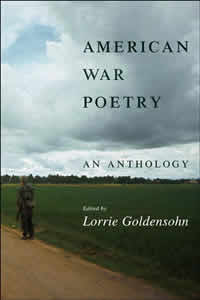Book Notes
 Lorrie Goldensohn, editor, American War Poetry; An Anthology (New York: Columbia University Press, 2006), 413pp.
Lorrie Goldensohn, editor, American War Poetry; An Anthology (New York: Columbia University Press, 2006), 413pp.
There are many good ways to try to understand humanity's dark impulse to slaughter each other in war. When I was thirteen my grandmother took me to Washington, DC in 1968, at the height of the Vietnam War. I still remember the sights and sounds of protest. Later I visited the War Memorial commemorating that war and watched as visitors groped along the wall to identify the name of a loved one. In 1995 our family stood on the streets of downtown Moscow while a military parade celebrated the fiftieth anniversary of the end of World War II (which claimed the lives of some 50 million Russians). Our family has also appreciated the oral history provided by my wife's stepfather who fought with the "greatest generation." I have also benefited from reading histories written by experts long after a war ended, those written while battles still raged (cf. Iraq), and autobiographical accounts written by soldiers (Jarhead). Everyone, in my opinion, should read Chris Hedges's masterpiece War is a Force That Gives Us Meaning.
Thanks to Lorrie Goldensohn, we can now try to understand war through poetry. About half of the 232 poems in this book were written by war participants. She has arranged the poems in chronological order by the poet's date of birth, grouping them according to specific wars (Colonial Wars, Revolutionary Wars, War of 1812, etc.). The poems begin with skirmishes with Indians in 1746 and end with insurgents in Iraq. Each section begins with a brief description of the war and its social context. Brief biographies of the poets (pp. 367–404) humanize them even more. These war poems written across nearly 300 years explore almost every human emotion you might imagine—pride and patriotism, propaganda and protest, victory and defeat, bravery and fear, death and mutilation, glorious triumphs and depressing futility, so-called "good" wars like World War II and "bad" wars like Vietnam. Contrary to the misconception that poetry is unrelated to "real" life, Goldensohn documents the efforts of poets interacting with the greatest of human tragedies.


